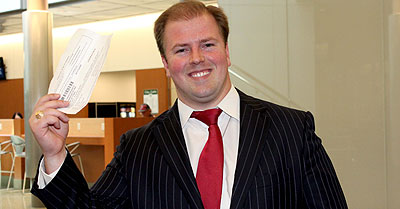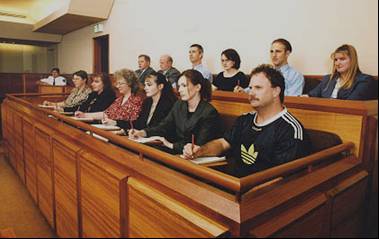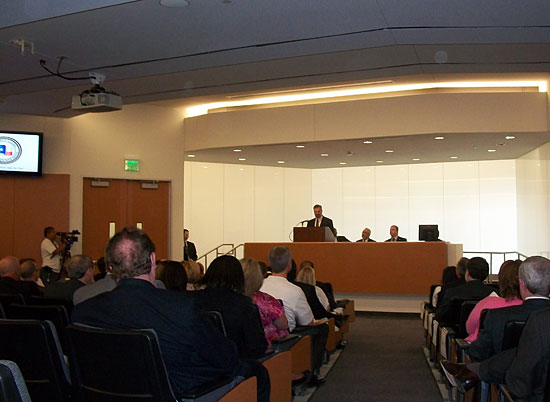Jury Duty
by Andrew Boyd
Today, jury duty. The University of Houston's College of Engineering presents this series about the machines that make our civilization run, and the people whose ingenuity created them.
If you've ever received a summons for jury duty, you've probably asked some of the following questions: Why me? Why now? Why did I have to sit around all day only to be sent home?
I recently spoke about these questions with Chris Daniel, District Clerk for Harris County, the third most populous county in the nation. Daniel holds a degree in mechanical engineering from the University of Texas. He appreciates the fact that "how many summonses to mail" is an engineering question.

Harris County District Clerk Chris Daniel holding jury summons
On the surface the problem seems relatively straightforward. Judges submit their cases weeks in advance, so the district clerk's office knows what's coming. If a case needs twelve jurors, and each side can strike up to six people during jury selection, then a total of twenty-four potential jurors are needed.

Unfortunately, the math isn't quite that easy. Some people who receive a summons are excused for hardship, as in the case of a single parent with young children at home. Others don't qualify because of criminal records. An individual receiving a summons has the option of postponing the date of service. A summons may be mailed to an incorrect address. In Harris County, the number of returned summonses runs into the double digits — Houstonians tend to move a lot in the three years since their last call to service. And, in spite of the fact it's a crime, many people simply ignore a summons when it arrives. The numbers add up. Roughly forty percent of people who are sent a summons don't respond to it.
As a result of these unknowns, the court must "overbook" — send out more summonses than the number of jurors who are needed. To get a jury pool of five hundred in Harris County, the court must issue three to four times that many summonses.
The problem's actually a lot like airline overbooking, although the goal is turned on its head. Courts have trouble when there aren't enough people to fill the seats; airlines have trouble when there are too many.
The mathematics behind airline overbooking is extremely sophisticated. As a rule, courts haven't reached that level of sophistication, but many employ some level of statistical analysis. In Harris County, for example, it's known that people respond to jury summonses at different rates at different times of the year — something the district clerk's office takes into account when issuing summonses. And there's another big cause of uncertainty: settling a case on the courthouse steps. If last minute negotiations lead to a settlement on the day of the trial, there's no need for any jurors in that court. Even this type of uncertainty can be accounted for in mathematical models, but that's uncommon.
So the next time you find yourself sitting in the jury assembly room waiting for your number to be called, remember that the courts face a challenging engineering problem with a lot of uncertainty. And don't forget to bring a good book.

Harris County's jury assembly facility
I'm Andy Boyd at the University of Houston, where we're interested in the way inventive minds work.
Notes and references:
Many thanks to Chris Daniel, Mike Lykes, and Claire Kennedy of the Harris County District Clerk's Office, all of whom provided valuable information for this essay.
The top two images are from government websites. The last image was taken by KUHF reporter Gail Delaughter.
This episode was first aired on July 19, 2012